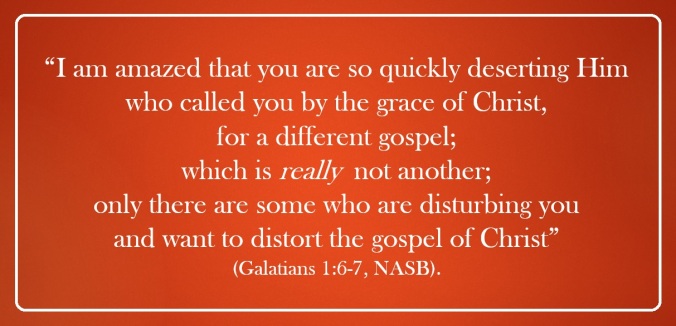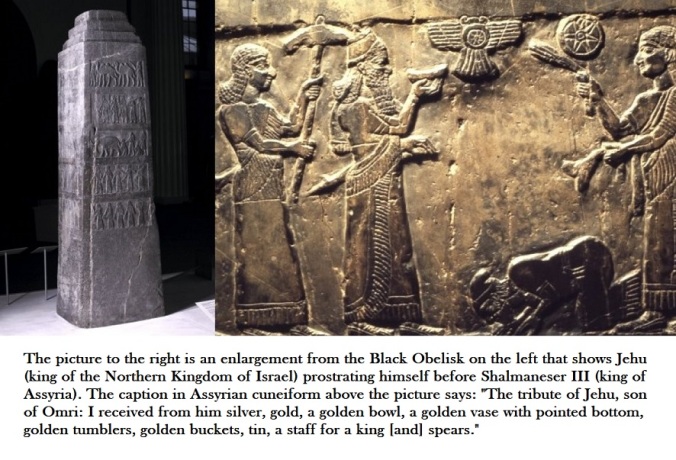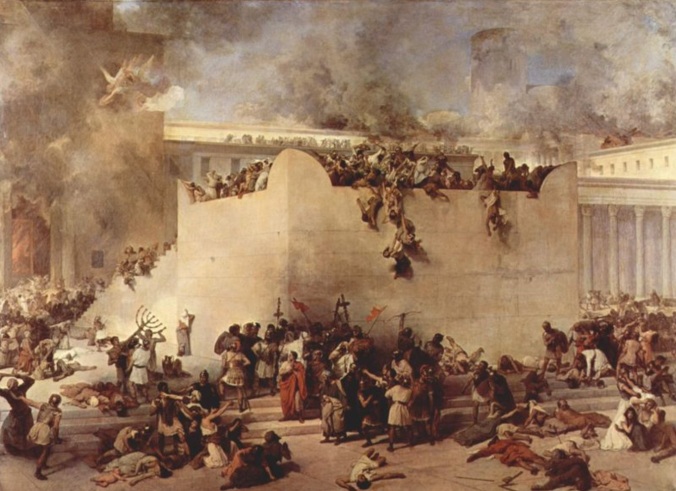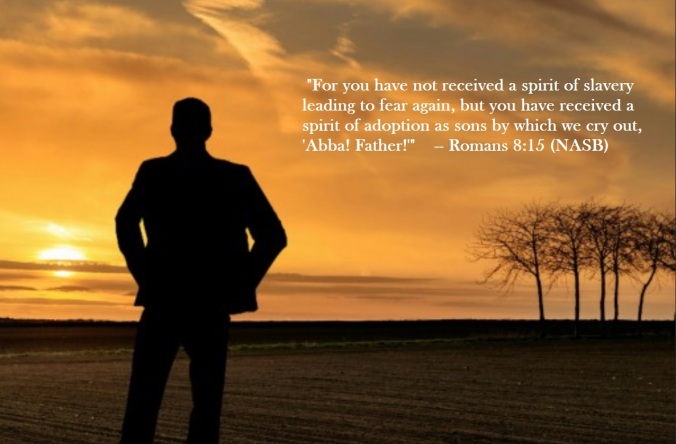“Go therefore and make disciples of all the nations…teaching them to observe all that I commanded you; and lo, I am with you always, even to the end of the age” (Matthew 28:19-20, NASB).
——————–
Contents:
1) Looking to Jesus (Doy Moyer)
2) Living To Be Like Him — Perfecting Holiness In Our Lives (Ron Drumm)
3) Holding Fast to the Head (Terry Wayne Benton)
——————–

-1-
Looking to Jesus
Doy Moyer
“Therefore, since we are surrounded by so great a cloud of witnesses, let us also lay aside every weight, and sin which clings so closely, and let us run with endurance the race that is set before us, looking to Jesus, the founder and perfecter of our faith, who for the joy that was set before him endured the cross, despising the shame, and is seated at the right hand of the throne of God” (Hebrews 12:1-2, ESV).
The Hebrews writer was concerned about these Christians turning their backs on Jesus and returning to their former ways. These Christians were facing persecution because they were following Christ, and the threat of wavering because of that suffering lingered. They needed reminding that what they have with Christ is far greater than what they had before, even with the persecutions and suffering. This was a matter of perspective that they needed to keep in front of them. That perspective was wrapped up in Christ.
How can Christians persevere when things get tough? How can we endure when it seems that life goes beyond endurance? The answer lies in the point made in Hebrews 12: look to Jesus. Other translations say something akin to “fixing our eyes on Jesus” (NASB) or “keeping our eyes on Jesus” (CSB). The idea is not just that we look in the direction of Christ or glance at Him now and then. Rather, the idea is to “direct one’s attention without distraction” (BDAG). We are purposefully turning away from other things that keep us distracted and focusing on Jesus.
Runners know that turning their heads away from the goal leads to distractions, and distractions contribute to losing the race. The Hebrews writer is not talking so much about a sprint, but more of the long distance race which requires putting away the things that are distracting (sin which easily entangles) and running with endurance and patience. In this race, distractions can be most deadly, so they needed to focus on Jesus. Other passages tell us something similar. For example:
“If then you have been raised with Christ, seek the things that are above, where Christ is, seated at the right hand of God. Set your minds on things that are above, not on things that are on earth” (Colossians 3:1-2).
“Brothers, I do not consider that I have made it my own. But one thing I do: forgetting what lies behind and straining forward to what lies ahead, I press on toward the goal for the prize of the upward call of God in Christ Jesus” (Philippians 3:13-14).
Fixing our eyes on Jesus, setting our minds on things above where Christ is, and pressing on toward the prize are all ways of telling us essentially the same thing. We have a goal, a purpose, a mindset, and a way by which to get there. That way is Jesus. When we look to Jesus, then, what are we seeing? Hebrews tells us that when we see Jesus, we are seeing the One who went to the cross (despising its shame) and endured through the suffering because there was something so desirable about the outcome.
When we look to Jesus, we are looking to the divine Son of God (Hebrews 1). We are also looking to the messianic Son of Man (Hebrews 2). He was manifested in the flesh in order to die for our sins, and this was anything but easy. After quoting from Psalm 8, the writer says, “At present, we do not yet see everything in subjection to him. But we see him who for a little while was made lower than the angels, namely Jesus, crowned with glory and honor because of the suffering of death, so that by the grace of God he might taste death for everyone” (Hebrews 2:8-9). Notice the terminology: “we see Him…” When we focus on Jesus, we see Him who died for us, who went through the suffering and death for us. He endured the cross on our behalf; we can endure the trials of this world on His behalf. But we cannot do it alone. We need Jesus, which also means we need to stay focused on Him as the Captain of our salvation.
The whole of the book of Hebrews is about looking to Jesus. The author points time and again to our Lord, showing us that what we have in Christ is better than anything else to which we might devote ourselves. The Hebrews might have gone back to the Law, but instead they were encouraged to understand the “better hope” they had in Christ, “through which we draw near to God,” and the “better covenant” for which Jesus died (Hebrews 7:19, 22). When we understand what we are looking at and why we need to maintain our focus, it becomes more likely to stay tough when life gets hard.
Going through difficult times should not be a surprise for the Christian. The Scriptures tell us time and again that this will be the case. How do we get through it? We fix our eyes on Jesus as our great example. We see something far greater, and in the end we know that our labor will not have been in vain (1 Cor 15:58).
— Via Bulletin Articles of the Vestavia church of Christ (Vestavia Hills, Alabama) , January 26, 2020
——————–

-2-
Living To Be Like Him — Perfecting Holiness In Our Lives
Ron Drumm
Toward the end of his life, the apostle Peter, under the guidance of the Holy Spirit, wrote these words, “but as He who called you is holy, you also be holy in all your conduct, because it is written, ‘Be holy, for I am holy’” (I Peter 1:15,16).
Can we actually be holy? Why is it that we feel holiness is unattainable? How could Peter make such a plea? Look at Peter’s life – he was rebuked by Jesus after confessing Him to be the Son of the Living God (Matthew 16:13-23); he denied the Lord three times after saying he would die for Him (Matt 26:33-35, 69-75); and sinned concerning his treatment of the Gentiles when the Jewish leaders came around (Galatians 2:1-10).
Maybe the problem comes from our misunderstanding of holiness. We often consider it to be perfection in our actions, and that perfection to us seems impossible. Holiness means purity, being blameless, set apart for God’s use, or sanctification (I Cor 6:11; II Thess 2:13-17). This definition does not indicate living perfectly, but rather it describes living a life dedicated to God.
Our character and attitude are in view. Paul expressed it this way, “Therefore, having these promises, beloved, let us cleanse ourselves from all filthiness of the flesh and spirit, perfecting holiness in the fear of God” (II Corinthians 7:1). It is a Spirit-guided process we endeavor to follow that brings about holiness in our lives.
Holiness is attainable. This is why Peter in all of his sins and failures could call us to be holy, as God is holy. It is a choice. I’m a vessel for God’s exclusive use, or I allow myself to be the devil’s tool. We are not created to be useless and worthless. We have been created in Christ Jesus to be God’s workmanship — people allowing themselves to be molded into holy servants of Christ (Eph 2:10).
It is our desire to glorify the God of heaven in every aspect of our lives. We are to “put on the new man which was created according to God, in true righteousness and holiness” (Eph 4:24). So, “pursue peace with all people, and holiness, without which no one will see the Lord” (Heb 12:14).
— via The Exhorter (of the Henderson Blvd. church of Christ, Tampa, Florida)
——————–

-3-
Holding Fast to the Head
Terry Wane Benton
Paul said to “let no one defraud you of your reward” (Colossians 2:18) by luring you into their misguided religious practices, and the way to not being lured into the false belief system is by “holding fast to the Head” (Colossians 2:19). That means to keep a firm grip on Jesus. Jesus will not mislead you. He leads you through and by means of the scriptures (2 Timothy 3:16-17), and these “completely furnish you unto every good work.” You don’t have to explore every counterfeit and know all about it. You just need to know Jesus through the scriptures so well that the counterfeit is more easily detected. Hold tightly to what you know about Jesus, the head of the church. Grow in that knowledge source, and then no one will mislead and defraud you of your reward in heaven. Hold fast!
— Via Daily Exhortation (London, England), 2020 Day 36 (February 5, 2020)
——————–
The Steps That Lead to Eternal Salvation
1) Hear the gospel, for that is how faith comes (Rom. 10:17; John 20:30-31).
2) Believe in the deity of Jesus Christ (John 8:24; John 3:18).
3) Repent of sins (Luke 13:5; Acts 17:30).
4) Confess faith in Christ (Rom. 10:9-10; Acts 8:36-38).
5) Be baptized in water for the remission of sins (Mark 16:16; Acts 2:38; 22:16; Rom. 6:3-4; Gal. 3:26-27; 1 Pet. 3:21).
6) Continue in the faith, living for the Lord; for, if not, salvation can be lost (Heb. 10:36-39; Rev. 2:10; 2 Pet. 2:20-22).
——————–
Tebeau Street
CHURCH OF CHRIST
1402 Tebeau Street, Waycross, GA 31501
Sunday services:9:00 a.m. (Bible class); 10 a.m. & 5 p.m. (worship)
Wednesday: 7 p.m. (Bible class)
evangelist/editor: Tom Edwards (912) 281-9917
Tom@ThomasTEdwards.com
http://thomastedwards.com/go (Older version of Gospel Observer website without pictures, but back to March 1990)
http://tebeaustreetchurchofchrist.org/
http://ThomasTEdwards.com/audioser.html (audio sermons)
















